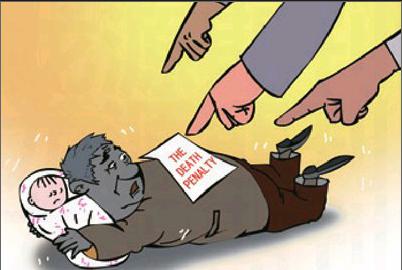Will Death Sentence Put an End To Human Trafficking?
2015-07-08

Discussion concerning the issue of whether or not human traffickers should be sentenced to death has recently spread like wildfire over social media, in particular on WeChat. Public participation in the conversation has been incredibly active, with many appealing for the death penalty for human trafficking. The reason is simple: Apart from ruining the child individually, the act throws the family of the child into a state resembling hell. Chinas Ministry of Public Security also claims that human traffickers committing serious crimes should be sentenced to death.
Meanwhile, some legal experts argue that imposing the death penalty on all human traffickers is against the legal principle of letting the punishment fit the crime, and that the death penalty alone, even if pervasively applied, will not be in itself sufficient to stamp out human trafficking. It has been widely suggested that buyers of trafficked children should receive punishment as human traffickers do. In addition, the countrys police and judicial authorities are being expected to up their game in the detection of human trafficking crimes and the rescue of affected children.
No trading, no trafficking
He Yong (www.nen.com.cn): Human traffickers make money by trafficking children, which results in the numerous families being rendered asunder. To sentence them to death is not going too far. When a child is trafficked, the whole family is thrown into turmoil. The current laws are not tough enough on traffickers and this is believed to be the major reason for the proliferation of the trade in China. It is believed that sentencing human traffickers to death and letting them pay the ultimate price for their crimes will to a large extent help curb human trafficking.
There have already been serious cases in which human traffickers were executed. For example, a major criminal by the name of Yu Lixiang involved in a baby trafficking case received capital punishment.
A more important reason for the rampancy of child trafficking in China, however, is the absence of penalties on those who buy children. No trading, no trafficking. The market for child trading is highly lucrative and as we speak, thriving.
Some families value boys more than girls and they therefore wish to purchase a son if they find themselves unable to conceive one naturally. Although Chinese law defines the buying of children as a criminal act, in practice, buyers are seldom sentenced as long as they have not harmed the children or frustrated rescue efforts.
Punishing child traffickers alone will not fundamentally address the issue. The buyers of children should be severely punished too. Of course, its also important to make it easier for couples that dont have children to adopt a child through legal channels, so that they dont need to recourse to illegal means. Meanwhile, the government has the responsibility to help poor families, so that they dont find themselves with little option but to sell their offspring.
Public outcry
Zhang Limei (Yanzhao Evening News): No legal obstacles exist barring human traffickers from being sentenced to death. In accordance with Chinas criminal legislation, those who traffic women and children shall be sentenced to at least five years imprisonment and in extremely serious cases, traffickers may be sentenced to death, but in reality, only a select few human traffickers receive the death penalty.
The proposal of “sentencing all human traffickers to death” will not necessarily help deter human traffickers. Instead, human traffickers might be forced to adopt more extreme methods toward their charges given that being found out means death. This will only serve to throw children into even greater danger.
What is really pertinent here is not whether or not human traffickers should all be sentenced to death, but why this proposal has been so zealously supported across the country, even by some celebrities.
The trafficking of a child will in most cases directly leads to the ruination of a family. Recent years have seen a surge of cases of trafficking children, but the penalties imposed are indeed not tough enough. In particular, those that buy children, as long as they have not hindered rescue attempts by the police or the childrens parents or done harm to the children, will not be held legally accountable. Moreover, in cases where the original parents of the trafficked children cannot be found, the children are often returned to their adoptive families. This is tantamount to declaring an amnesty for those who purchase children, and it may serve to encourage the practice, in turn fueling demand.
In summation, although the public demand for all human traffickers to be sentenced to death is unreasonable, legally or otherwise, advocates voices must be heard, and tougher punishment should be imposed on both child traffickers and child buyers.
Wu Longgui (Henan Business Daily): It is said that around 1 million people have agreed to the proposal for the death sentence for all human traffickers on WeChat. It would be quite a stretch to surmise that all of these people are not familiar with the law and lack basic legal knowledge, having simply taken temporary leave of their sanity en masse as regards this issue.
In my opinion, these people want to express their desire that all trafficked children be saved and receive aid, or rather they are expressing their dissatisfaction with the abject situation the trafficked children find themselves in and potential risks this industry presents to all children across the country. This extreme dissatisfaction has transmuted into a demand for the death penalty to be administered for all human traffickers. Meanwhile, the authorities have to hold up their hands and admit that the success rate for finding and retrieving traf- ficked children is low. China is still lacking in a well-thought-out set of measures to curb human trafficking. Particularly egregious is the lack of penalties on child buyers, whose demand fuels this illicit industry.
Wang Chenchen (www.nen.com.cn): We can easily smell the indignation and fear in the relaying of a post supporting the sentencing of human traffickers to death on WeChat. The sharers clearly sympathize with the plight of human trafficking victims and more importantly, they are expressing the amplified anxiety and even horror that this grim fate might befall their own children.
Nowadays, most families have only one child and this progeny represents the hopes and dreams of the whole family. However, they feel their children are now living under the shadow of being abducted. News on human trafficking is often broadcast through the media and online. Parents are easily provoked by such news, worried about when they might fall prey to the same disaster. The high proportion of unsolved human trafficking cases is yet another source of anxiety. Statistics from the National Working Committee on Children and Women under the State Council shows that in 2012, more than 18,000 cases involving trafficking of women and children were filed, but only 4,000 cases were finally put to bed, lower than 22 percent. This is undoubtedly a worrisome rate.
To be frank, there is indeed a long way to go before the public can rest easy with regard to child trafficking. More financial and human resources need to be pledged toward the investigation of trafficking cases and the bringing to justice of those culpable. The relevant departments need to set up a nationwide network concerning the DNA information for newborn babies and of the basic information of all trafficked children. Such a network will help prevent children from being stolen and trafficked and in case any children are trafficked, the network would help retrieve them. It is also suggested that child buyers should be subject to the same punishment as the traffickers, so as to strike the practice at its roots.
Zhu Qingjian (Strait News): In the view of many legal experts, regardless of the crime, the deterrent effect of capital punishment is limited. Worse still, if human traffickers know they face death if found out, the well-being of the victim will be placed in greater peril and it will become more difficult for the police to find the child.
The publics call should be listened to and used as a point of reference while a more rational law is being considered. More importantly, we need to lend our ears to legal professionals. They can facilitate the formulation of better laws that can more effectively curb trafficking of persons.
